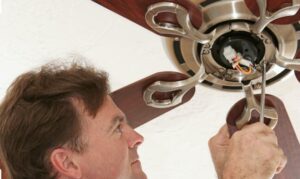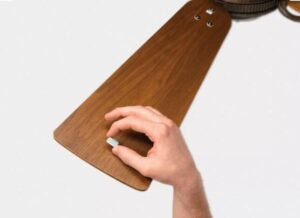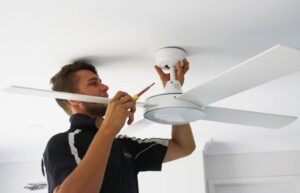Clicking noises can make a ceiling fan quite annoyed. Checking on your ceiling fan to avoid waking up in the middle of the night due to the clicking sound is therefore essential.
However, before you check on your ceiling fan, it is vital to approach it knowingly about why the ceiling fan is producing the clicking sound.

Why the Ceiling Fan is Making the Clicking Sound?
- The accumulation of dust in the ceiling fan motor.
- Rusting due to lack of lubricating the ceiling fan motor.
- If the fun is not attached to the ceiling correctly due to the loosening of the screws.
- The unbalanced clip that holds the ceiling fan blades.
- Loosening of the ceiling fan globe, some ceiling fans may have a globe covering the bulbs.
- Loose or the bent blades.
- Lack of rubber spacers.
- Inappropriate light dimer tool.
- Low voltage Capacitors and dimmers.
How to Fix the Clicking Sound?
To fix some of the ceiling fan complications, we do not need a professional expert to fix them. Still, some difficulties require our common sense approach to solve them.
Thus, before setting them by yourself, turn/switch off the ceiling fan power and ensure kids are not around to avoid injuries or interfere with some ceiling fan components.
You can also prepare yourself with a microfiber towel, lubricating oil, an all-purpose cleaner, a ladder, and some opening or tightening tools for nuts or screws.
Regular maintenance and cleaning of your ceiling fan
Always use a dry microfiber towel to clean the blades and other ceiling fan parts to remove the dust from further accumulating inside the motor bearings to avoid drying the lubricant.
When the bearing is dry, it starts to tear and wear. Thus, it produces an irritating clicking sound when the fan rotates.
Avoid using a wet microfiber towel, instead, use an all-purpose cleaner to wipe the blades to avoid rusting the blades and rusting the fan’s inner components due to the moisture left behind while using a wet towel.
Regular check the screws connecting the ceiling fan
Regularly check the screws connecting to the ceiling because the screws can become loose over time, producing the clicking sound whenever the blades are spinning.
Thus, it advisable to tighten them but not too tight. If the screws are missing, please replace them immediately before your fun breaks because they may detach from the ceiling.

Confirm if the globe on the light kit and the bulb are in place
Some ceiling fans have been decorated with globes to cover the bulb. If the globe is loose or not tightened, it will produce a clicking sound while the blades are spinning.
Consider replacing the globe if they are too old or worn out because they might not hold the screws in place for too long.
However, if you found out the globe on the light kit is not the reason behind the noise, then check on the light bulbs connected to the ceiling if they are properly screwed.
If not correctly fixed, the bulbs can cause the clicking sound due to the screw thread that comes into contact to wobble inside the base.
Tighten the bulb to the ceiling fan properly to avoid the bulb coming into contact with the base.
Tighten and balance the loose blades
When the blades are not at the right angle or loose, they will wiggle while spinning, producing an irritating sound.
It is advisable to tighten the blades well or balance their pitch to be proportional.
When loose or unbalanced, it will scratch the ceiling, hence causing the clicking sound.
It is significant always to check or service your fan if they are in place or balanced every weekend when you are off duty.

Change bad capacitors or dimmers control
Dimmer control is used to control the fan speed, but they are not for controlling the ceiling fans’ speed. Hence some of the fans being handled by the dimmer switches may cause a clicking sound.
However, the sound might be unnoticeable during the day. Still, it could be uncomfortable and annoying when you run the ceiling fan at night.
In case you find out the problem is due to the dimmer switch, consider replacing it with the standard speed controls.
But if the problem is not from the dimmer control check on the ceiling fan capacitor, that might be the source of the clicking sound.
Low voltage capacitors cause the motor to struggle while propelling the blades.
Suppose multiple fans are using the same capacitor. In that case, it will lead to lower voltage levels, leading to clicking sound being conveyed.
Consider changing the capacitor that will supply above 105 volts A/C, which is the best for the motor to efficiently propel the blades.
Always ensure the fan bearings and motor is well lubricated
The dust penetrating inside the ceiling fan motor can lead to the depletion of lubrication oil in the engine.
Once depleted, it will expose the fan to a lot of friction, leading to tearing and wearing, which further produces a clicking sound.
The other thing that may cause depletion of oil is the motor’s rusting because of high humidity or leakage from the ceiling, which may cause the sound.
If you found out it’s either dry or rusty, please put a few drops of lubricating oil on the shaft above the motor and ensure it seeps through the bearings, then rotates the fun to ensure the oil is evenly distributed for the motor to run smoothly.

Check the rubber spacers
If your ceiling fan has a spacer between the ceiling and the mounting bracket, confirm if the rubber washer is either worn out or not.
If worn out, it can cause a clicking sound because there is no cushion to prevent vibration between the motor flange and the mounting bracket.
If your fan doesn’t have the spacer consider installing it to avoid clicking.
Employ a professional to check the fun
This is the last option that you should be seeking after all the attempts of fixing it fails because the ceiling fan may be having a severe problem or complication beyond your basic knowledge and experience.
Even though acquiring their service can be more expensive, it is worth repairing it than buying a new one.
Conclusion
Understanding your ceiling fan is very important because it will encourage you to check and maintain it regularly before developing some complications that you cannot handle in the future.
Furthermore, you may end up running it at a high cost because when the motors or anything is loose, it also reflects the power bill’s high expense.
